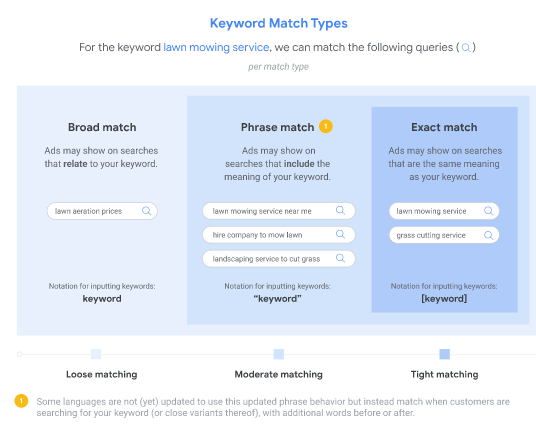Google made a major announcement last February regarding Match Types (aka keyword options) for keywords.
The important announcement has been emailed to all advertisers. Not only has this explicit communication created some uncertainty among advertisers; the change in these Match Types can also affect your campaign performance.
It is important to know that Google has implemented this change with a view to broadening Match Types and is therefore increasingly focusing on automation and the use of Smart Bidding. The context of the search is increasingly understood by Google and so are organic search results.
In this article, I indicate what is changing and I give my vision of the changes. Finally, I will explain what you could do in the coming months in order to properly prepare for this final change.
Key Word Match Types: What changes and when?
The changes that Google announced relate specifically to the terms Phrase Match (will be broadened) and Broad Match Modifiers (will disappear) as we know / use them now.
The changes take place in two phases; depending on your language. The first languages to be updated are English, German, Spanish, French, Italian, Dutch, Portuguese and Russian.
– Phase 1: From mid-February 2021: Phrase Match will be expanded and existing BMM keywords will be updated.
The BMM keywords then function the same as Phrase Match keywords. This is expected to be fully implemented in April.
– Phase 2: From June 2021: All other languages will be provided with the same update. Google expects to complete this in July.
– In July 2021: Once the updates are globally implemented, you will no longer be able to enter / upload new BMM keywords in Google.

Search term vs keyword and a practical example
Previously, Phrase Match keyword groups differed from BMM keywords because with Phrase Match, word order was important.
In this context, it is first of all important to explain the difference between a keyword and a search term.
A search term is the word or phrase that a user enters when he / she searches Google or one of the other platforms in the search network.
Later on, in the context of automation / Smart Bidding, I use the term search term, because Google can adjust the bid at the search term level with Smart Bidding. A keyword can match multiple search terms and Google can use a different bid for each keyword.
First back to the keyword. A keyword is the word or phrase that Google advertisers (now) set for a particular ad group to target their ads to customers.
In the past, Phrase Match’s keyword “white sneaker” was displayed for the search terms “nike white sneaker near me”, but not for the search terms “nike sneaker white near me”. The BMM keyword white sneaker was shown by both.
Advertisements with Phrase Match will now be displayed if they have the same search intention as your keyword and the word order does not matter anymore. Moreover, BMM will disappear completely.
Google itself explains this very well in this image, which was published at the same time as the announcement:

Why Google’s timeline is important:
How does this change compare to other updates Google has made in the past? It is not the first time that Google has changed matches and they always do so with a view to broadening.
Why this is important in the context of these changes is explained below:
● In 2014, exact matches were no longer exact when Google included plurals, misspellings, and other variants;
● In 2017, exact match became even broader when function words (de, and dat) and word order were included in the variations to which they could match;
● In 2018, exact search was also matched with search terms that had the same intention;
-> Later in 2019, this match was also expanded to keyword phrases and broad match modifiers.
In addition to the changing keyword option, Google has launched several search network campaign types that do not rely specifically on keywords, such as Google Shopping and Dynamic Search Ads (DSA).
In addition, Google has announced new campaign types, such as the performance max campaign, which is not run on keywords, but on Dynamic Search Ads.
A logical step from Google
Given this timeline of changes, it’s not surprising that Google has now taken this step. A cynic would say the only reason Google is making these changes is to get more money from advertisers. This is because broadening keyword options will increase the number of paid clicks.
On the other hand, Google has significantly improved its algorithms to better understand the intent of a search term.
By matching the keywords to more search terms, advertisers have greater reach with the same effort and can increase their revenues with the same return on ad spend (ROAS) or cost per acquisition (CPA), provided you use Smart Bidding (I will explain this later).
Advertisers running shopping campaigns are already familiar with the above phenomenon and often enjoy targeting their products to a very broad match of related searches.
Other signals that increase the chance of a conversion
In addition, many other relevant signals are involved that can increase the chance of a conversion, such as the target group behind the search term.
Behind every click is someone who can fall into a relevant target group, who can use a certain device, but factors such as time, location and language settings should also be taken into account.
Many advertisers are already successfully applying an audience-based advertising strategy to non-keyword-based platforms such as Facebook, Instagram, and Pinterest.
If, on the other hand, as an advertiser you have to pay less for search terms that are less relevant and where there is less competition, then the lower costs can outweigh the slightly lower conversion intention.
Advice: Do use Smart Bidding
I do recommend using Smart Bidding. Without Smart Bidding, you cannot bid proportionally on search terms that you have not encountered before or that you have not thought of.
This is because, if you place manual bids, you bid the same on the more exactly matching (and more likely better converting) queries as you do for the broader (and less quickly converting) queries.
This affects your ROAS and / or CPA. You set the bid at the keyword level, but you activate a whole range of closer and not as close matching searches.
In addition, a previous update from Google made it impossible to view all the data at the search term level. As a result, as an advertiser, you cannot see exactly where your money may be leaking.
Add this together and you probably also come to the conclusion that Google is pushing advertisers more towards Smart Bidding with this step 😉
How should you act in the coming months?
In any case, keep a close eye on your campaign performance in the coming months. I will first discuss what may seem like a logical move, but what you should definitely not do:
Firstly, don’t change your BMM keywords to Phrase Match before July. Your current BMM keywords will function the same as Phrase Match keywords after the update.
In this way, you prevent loss in search volume and keyword history. Moreover: If you make the adjustment now; then it may be that the update has not yet taken place. As a result, you miss traffic that was normally caught by your BMM keyword, but not (yet) by your Phrase Match keyword.
What you should do
Changing performance does not always have to be negative: positive changes can also occur. The change can also generate more traffic, for example, but then adjust your budget so that you are not limited by it.
Although the following is very customer / account specific, you can take these three steps if something changes in your performance:
- Pause keywords
- Use keyword exclusions
- Change goals and budgets
As I just mentioned, if you’re not already using Smart Bidding, you should definitely consider it now. Without Smart Bidding, you cannot bid proportionally on search terms that you have not encountered before or that you have not thought of.
It is also important that you keep restructuring your account with this in mind.
Search automation software
Due to the general shift to a more unified campaign structure in combination with Smart Bidding, search automation software like Adchieve, (also known as a ppc management tool), may also be welcome to you.
It makes managing campaigns less time consuming and simple and with, for example, the text ad module, you can very easily merge your campaigns and ad groups so that you achieve better results in combination with Smart Bidding.
The most important thing to take away from this article is to prepare for a different way of uploading keywords in which the main change is that BMM keywords will soon be gone for good.

